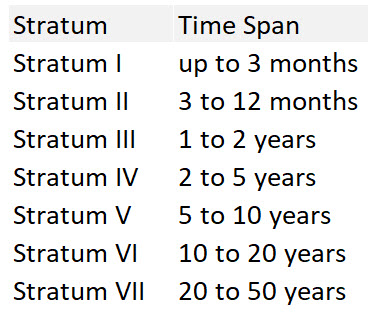Weekly Bookmarks
61st Edition – April 5, 2020
A lifetime of glory is worth a moment of pain.
Louie Zamperini – as told to Laura Hillenbrand – Unbroken
1. Revisiting the Requisite Organization in a Time of Crisis
An informal CEO poll might reveal many business leaders are focusing on just staying alive where the current planning cycle is days, possibly weeks. Planning beyond just one month is difficult for some industry CEOs.
However, I’ve been impressed with CEOs who remain positive and are exploring opportunities in the months ahead.
And that reminds me of the stratum boundaries introduced by Elliot Jacques and his Requisition Organization theories.
For example, a Stratum I person is mostly focused on today’s work only. Work, go home, come back, and keep repeating. Stratum II team members are focusing at least 3 months out to even one year. Now we’re talking process, project, product, and general managers.
So what?

2. We Need Stratum V, VI, and VII Leaders More than Ever
Critics of the Requisite Organisation (RO) cite the lack of research and science backing the theories of Jacques (pronounced jacks). Can’t we say that for the teachings of John Maxwell, Jim Collins and his Level 5 Leadership model, or concepts from servant leadership?
For now, let’s just accept RO as a strong theory of organizational behavior. So let’s re-examine three of the strata and the employee timeframes which are generally shaped by cognitive abilities –
Stratum V – 5 to 10 years
Stratum VI – 10 to 20 years
Stratum VII – 20 to 50 years
All of us tend to operate within the boundaries of a certain stratum stemming from our gifts and unique abilities. For instance, financial leaders generally work within Stratum III or even IV (1 year to 5 years).
As we witness a microorganism that has taken life away from us and brought global economies to its knees, we need our leaders to still look ahead in not just solving today’s problems but those that we’ll face in years to come.

3. Should We Heed Cal Newport’s Advice on Digital Minimalism During this Crisis?
I’m a big fan of Newport and So Good They Can’t Ignore You and Deep Work are books I recommend to peers. And that got me to wondering what Cal has to say about social media activities from a guy who wrote Digital Minimalism.
Here are three key points on Digital Minimalism that Newport recently wrote on his blog:
- check one national and one local news source each morning
- don’t check any other news for the rest of the day
- distract yourself with value-driven action; lots of action
If you can, read the full post. He nails it on the charioteer allegory.

4. The Law of Unintended Consequences
“Oh, I had not thought of that.” I’m convinced that’s why I’m paid to do what I do. Leaders set a direction. Along comes a hick from the Midwest who suggests, “But if you do that, this could happen.”
Last Friday, banks were blown away with Payroll Protection Program loan applications from small businesses across the U.S. According to the WSJ, about 10 thousand loans had been approved accounting for about $3.2 billion near the end of the afternoon.
Never has the law of unintended consequences weighed so heavily on my mind as businesses rushed to apply for this SBA money. When businesses say ‘yes’ to this financing, they could be shutting the door on other options.
Here’s the main point – when making decisions take stock of future consequences. Natural instincts serve us well on a sinking ship. But never forget to study your options when making important decisions of any kind.

This Week’s Podcast
Mark and Bruce discuss the unintended consequences of selecting the wrong relief package from the SBA (primarily for U.S. listeners).
5. Do We Need a Dale Carnegie Pep Talk?
In my early 30s, I worried a bit too much. Worry was passed down to me from one of my parents. Oddly, it was a book with a simple message that snapped me out of my negative thoughts (not entirely, but substantially).
We know Dale Carnegie from his classic, How to Win Friends and Influence Others. But How to Stop Worrying and Start Living holds a special place in my mind and heart.
My favorite concept in the book is putting a stop-loss on stress (and grief).
In short, in every stressful situation, we have to ask, “What’s the worst that can happen?” As I answer that question and for the others, I help, worry and potential stress turns into preparedness and action.
… when the fierce, burning winds blow over our lives-and we cannot prevent them-let us, too, accept the inevitable. And then get busy and pick up the pieces.
Dale Carnegie – How to Stop Worrying and Start Living

Action Item
Is the Wall Street Journal too much information too consume on a daily basis? Have you tried The Economist? The COVID-19 coverage is on par with any other media I’ve uncovered.
Recent Bookmarks – 60 | 59 | 58
Thank You For Reading
If you like the content above and the posts at CFO Bookshelf, may I ask a favor? Feel free to share this with other readers along with commenting on your favorite blog posts on LinkedIn, Twitter, or Facebook.
Take care and stay confident and strong this week. Always be learning and growing in times of hardship.

Leave a Reply